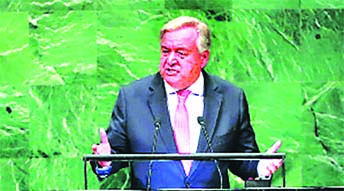
PTI, United Nations :
UN chief Antonio Guterres on Tuesday warned that the world is suffering from a bad case of “trust deficit disorder” where polarisation is on the rise and cooperation among nations is more difficult as he appealed to the global leaders for renewed commitment to a rules-based order.
Secretary-General Guterres, giving his second address as the UN chief to the world leaders from the iconic lectern in the General Assembly hall, painted a stark picture of the chaos in international order, saying cooperation among countries is less certain and more difficult, and divisions in the Security Council are stark.
World leaders from 193 UN member states, including US President Donald Trump, listened to Antonio Guterres as he voiced concern over the paradoxes facing the globe today.
The U.N. chief painted a grim picture of the state of the world in his opening address to the annual gathering of presidents, prime ministers, monarchs and government officials from the U.N.’s 193 member nations. He pointed to rising polarization and populism, ebbing cooperation, “fragile” trust in international institutions and “outrage” at the inability to end wars in Syria, Yemen and elsewhere.
“Democratic principles are under siege,” Guterres said. “The world is more connected, yet societies are becoming more fragmented. Challenges are growing outward, while many people are turning inward. Multilateralism is under fire precisely when we need it most.”
Trump has been very critical of the United Nations and his administration has withdrawn from key UN institutions such as the Human Rights Council and the landmark UN pacts such as the Paris Climate Agreement.
“Our world is suffering from a bad case of ‘trust deficit disorder’. People are feeling troubled and insecure. Trust is at a breaking point. Trust in national institutions. Trust among states. Trust in the rules-based global order.
“Within countries, people are losing faith in political establishments, polarisation is on the rise and populism is on the march,” Guterres said in his address to the General Assembly at the opening of the high-level General Debate.
Trust in global governance is also fragile, as 21st-century challenges outpace 20th-century institutions and mindsets, he said.
But French President Emmanuel Macron assailed self-interest in his address soon after Trump, saying “nationalism always leads to defeat.”
He drew loud applause for his impassioned plea against isolationism and for global cooperation.
“Friends, I know you may be tired of multilateralism. I also know that the world is flooded with information, and one becomes indifferent. It all starts to look like a big show,” he said. “Please, don’t get used to it, don’t become indifferent. Do not accept the erosion of multilateralism. Don’t accept our history unraveling. I’m not getting used to this, and I’m not turning my head.”
In his speech, Iranian President Hassan Rouhani took a dig at Trump over the issue – indirectly, if not by name.
“Confronting multilateralism is not a sign of strength; rather it is a symptom of the weakness of intellect – it betrays an inability in understanding a complex and interconnected world,” Rouhani said.
The UN chief said that while the world never had a true system of global governance, still over decades nations established solid foundations for international cooperation but today, the world order is increasingly chaotic.
“Power relations are less clear. Universal values are being eroded. Democratic principles are under siege. The rule of law is being undermined. Impunity is on the rise, as leaders and states push the boundaries at home and in the international arena.
“The world is more connected, yet societies are becoming more fragmented. Challenges are growing outward, while many people are turning inward. Multi-lateralism is under fire precisely when we need it most,” Guterres said.
He stressed that while individual leaders have the duty to advance the well-being of their people, they also have the responsibility to promote and support a reformed, reinvigorated and strengthened multilateral system.
“We need renewed commitment to a rules-based order, with the United Nations at its centre and with the different institutions and treaties that bring the Charter to life,” he said.
Guterres voiced this commitment to reform, and to making the United Nations more effective in responding to the needs and aspirations of “we the peoples”.

